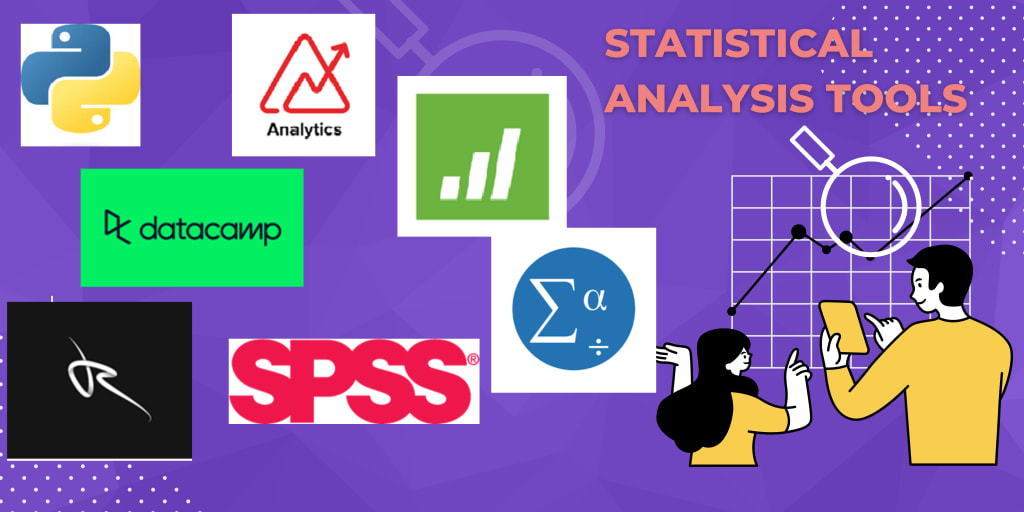The 8 Best Online Tools for Statistical Analysis
Behold, presented here are the eight finest online tools for statistical analysis.

Introduction
Statistical analysis stands as a formidable tool, enabling us to unravel and grasp the essence of data. It empowers us to address inquiries concerning data distribution, the interplay between variables, and the likelihood of events.
Previously, statistical analysis proved to be an intimidating endeavor reserved solely for statisticians and other domain experts. Even though it sounds fancy, all this means that online tools have made it super easy for anyone to do statistical analysis. Now, it's as simple as a few clicks!
Behold, presented here are the eight finest online tools for statistical analysis.
1) Google Sheets
Google Sheets, a spreadsheet program, emerges as a valuable resource for conducting rudimentary statistical analysis. It encompasses functions that facilitate the computation of means, standard deviations, correlation coefficients, and other statistical descriptors.
Features of Google Sheets
- Collaboration: Multiple users can work on the same document simultaneously. Changes are saved and synced in real-time.
- Sharing and Permissions: You can share your Google Sheets with others and set permissions for viewing, commenting, or editing.
- Cloud-Based: All your spreadsheets are stored on Google's servers, which means you can access them from any device with an internet connection.
- Compatibility: Google Sheets supports Excel files, which means you can import and export to the Excel format.
- Formulas and Functions: Google Sheets supports a wide range of mathematical, statistical, and text functions, similar to Excel.
- Add-ons and Extensions: Google Sheets supports add-ons and extensions that can enhance its functionality. These can be found in the Google Workspace Marketplace.
- Charts and Graphs: Google Sheets has robust charting and graphing tools, allowing you to visualize your data in various ways.
- Pivot Tables: Google Sheets supports pivot tables, a tool that allows you to summarize and analyze large datasets.
- Scripting and Automation: With Google Apps Script, a JavaScript-based language, you can automate tasks and create custom functions in Google Sheets.
- Version History: Google Sheets keeps a record of all changes made to a document, allowing you to see who made changes and when, and to revert to earlier versions if necessary.
2) Minitab
Originally devised in 1972 at Pennsylvania State University by Barbara F. Ryan, Thomas A. Ryan, and Brian L. Joiner, Minitab remains a preferred statistical software package in both business and academic settings.
Features of Minitab
Minitab encompasses an extensive array of statistical analysis features, encompassing regression analysis, ANOVA, and time series analysis.
Minitab proves itself user-friendly, even to those without prior statistical experience. The software offers an intuitive interface and includes a plethora of wizards to guide users throughout the statistical analysis process.
Minitab can be accessed in both desktop and cloud-based versions. In other words, the desktop version of the software is a standalone program that you can run on your own computer. You don't need to be connected to the internet to use it.
However, the cloud version is something you can use on any device with the internet, no more than opening your web browser.
3) R Software
R is a free and open-source statistical software environment. It was created by Ross Ihaka and Robert Gentleman at the University of Auckland in 1993.
R, a freely available open-source statistical software environment, provides an exceptionally potent tool for a vast spectrum of statistical analysis tasks. R is like a Swiss Army knife for statistics.
It can do a bunch of different things like predicting trends (regression analysis), comparing groups (ANOVA), studying changes over time (time series analysis), making data look pretty (data visualization), and even teaching computers to learn from data (machine learning).
R is a popular choice for statistical analysis. It is used by people all over the world to run their businesses, learn new things, and make decisions that affect their lives.
4) Python
Python, a versatile general-purpose programming language, extends its utility to statistical analysis as well. It was created by Guido van Rossum in 1991. Renowned among data scientists, Python garners favor due to its ease of comprehension and utilization.
With Python, you can analyze data from a variety of sources, so you can get a complete picture of what is happening. Python can be used to create a variety of graphs, including histograms, scatter plots, and box plots.
If you're looking for a programming language that can help you analyze data in a powerful and easy-to-use way, Python is a great choice.
People all over the world use Python to run their businesses, learn new things, and make decisions that affect their lives.
5) Socrative
Socrative emerges as an all-encompassing online platform that facilitates the creation and delivery of interactive quizzes and surveys. It proves invaluable in acquiring data from students, employees, or customers, which subsequently can be employed for statistical analysis.
Socrative provides teachers with detailed reports on student performance. These reports can be used to identify areas where students need additional help and to adjust instruction accordingly.
Socrative is your gateway to collecting valuable data from students, employees, or customers.
6) Zoho Analytics
Zoho Analytics is a cloud-based business intelligence and data analytics platform. It was developed by Zoho Corporation in 2010.
Operating within the realm of cloud-based business intelligence and data analytics, Zoho Analytics boasts a versatile toolset capable of tackling a wide array of statistical analysis tasks.
It features an extensive repertoire of pre-built reports and dashboards, fostering the visualization of data. Additionally, Zoho Analytics incorporates a scripting language to construct customized analysis workflows.
Zoho Analytics is easy to use, even for users with no prior data analysis experience. The software has a user-friendly interface and includes a variety of wizards that can guide users through the data analysis process.
Zoho Analytics is available in both a free and paid version. The free version is limited to 3 users and 1000 data points, while the paid version is unlimited.
7) DataCamp
DataCamp is an online learning platform that offers courses on data science and machine learning. It was founded in 2013 by Hadelin de Ponteves and Guillaume Charpiat.
DataCamp represents an online learning platform that offers comprehensive courses covering the fields of data science and machine learning. Within its curriculum lies a dedicated track specializing in statistical analysis, guiding users in the utilization of R and Python.
Embrace DataCamp as your go-to platform for mastering the art of statistical analysis using R and Python.
DataCamp also offers a premium subscription that gives you access to additional features, such as graded exercises, projects, and community forums.
8) SPSS
SPSS stands for Statistical Package for Social Sciences. It is a software suite that is used for data analysis and statistical computing. SPSS was originally developed in 1968 by Norman Nie, C. Hadlai Hull, and Dale Bentler at the University of Chicago.
SPSS is a powerful tool that can be used for a wide range of statistical analysis tasks. These tasks include descriptive statistics, regression analysis, ANOVA, and multivariate analysis.
It is easy to use, even for users with no prior statistical experience. The software has a user-friendly interface and includes a variety of wizards that can guide users through the statistical analysis process.
SPSS is available in both a desktop and cloud-based version. The desktop version is installed on your computer, while the cloud-based version is accessed through a web browser.
SPSS is a popular choice for statistical analysis. It is used by businesses, academic institutions, and government agencies around the world.
Determining the Suitable Tool for You
The choice of the most suitable tool hinges upon your individual requirements and needs. For those seeking simplicity and ease of use, Google Sheets serves as an excellent option.
Alternatively, those desiring more advanced capabilities may opt for Minitab or R. Python enthusiasts will find solace in utilizing Python for their statistical analysis endeavors.
Irrespective of the chosen tool, statistical analysis remains an invaluable instrument for comprehending and deriving meaning from data. So why not embark on a journey of discovery today?
Tips for Selecting the Perfect Tool
Financial Considerations: Take into account your budgetary constraints, as some tools outlined in this article offer free usage, while others require a subscription.
Skill Level Assessment: If you find yourself at the nascent stages of statistical analysis, it would be wise to choose a tool boasting a user-friendly interface.
Analysis Type Deliberation: Certain tools prove better suited for specific types of analysis, so ponder over your analysis requirements before making a decision.
Perusing Reviews: Extensive reviews of statistical analysis tools are available online. Delving into these reviews can significantly assist you in identifying the tool that aligns with your needs.
Conclusion
To conclude, a multitude of exceptional online tools stand at your disposal for statistical analysis. The optimal selection among them hinges on your specific requirements and preferences.
Rest assured, all tools mentioned in this article exude power and ease of use. Take a leap of faith and explore the realm of statistical analysis by embracing one of these tools today.
Hopefully, this article has proven insightful, providing you with an overview of the premier online tools available for statistical analysis. If you have any inquiries, please feel free to voice them in the comments section below.
Summary of article
This article is about the best online tools for statistical analysis. It discusses eight tools in detail, namely Google Sheets, Minitab, R, Python, Socrative, Zoho Analytics, DataCamp, and SPSS.
The article highlights the features and benefits of each tool and provides information on their applications in statistical analysis.
The content emphasizes the accessibility and usability of these tools, making statistical analysis more approachable for individuals without extensive statistical expertise.
The article concludes by offering tips for selecting the right tool based on budget, skill level, analysis requirements, and reviews.
Relevant Articles
On Udemy: Top 10 Best Free Application Courses
ما الفرق بين اكسيل و تشات جي بي تي: مقارنة شاملة لأدوات تحليل البيانات
About the Creator
Ahmed Bahaa Eldin Mohamed
Get Ready for the Smart Revolution with Technology for Smart Sphere's Expert Analysis. You will know all about the latest Insights on Smart Technology






Comments
There are no comments for this story
Be the first to respond and start the conversation.